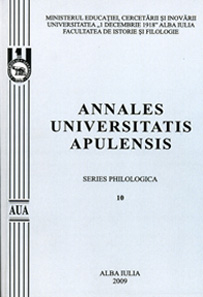REGIZORUL – DE LA TEHNICIAN LA HERMENEUT. VALENŢE TRANSCULTURALE ALE SPECTACOLULUI DE TEATRU
The Theater Director - from a Technician to a Criticist. Transcultural Hypostasis of the Theatrical Play
Author(s): Anca Daniela MihutSubject(s): Theatre, Dance, Performing Arts
Published by: Universitatea »1 Decembrie 1918« Alba Iulia
Keywords: spiritual theatre; myth; symbol; self-knowledge; scenic language and code.
Summary/Abstract: Beyond theatre’s artistic dimension, it has always been an arena for the contention of ideas, a means of educating, a tribune for ideological debates or a means of political propaganda. Conversely, theatre can be regarded as a very complex process of self-knowledge, healing and spiritual freedom. Greek tragedy has remained the unquestionable model and ideal for many generations of playwrights and composers. French classical theatre, French lyrical tragedy, Italian baroque opera and later opera seria, and many other works of the nineteenth and twentieth centuries are populated with mythological figures and refer to a universe parallel to ours, working as a mirror. The question that arises is that of why this fascination for mythology and mythological figures has lasted for centuries. Empowered by an all-encompassing, transcendental perspective, Mircea Eliade offers a convincing answer in regarding man not only as a mixture of complexes, such as Freud did, but as a ‘sum of myths’. It seems that therefore, all artists who have appealed to myths must have intuitively perceived their revealing and transformative power. Applying such an interpretation, the theatrical play proposes a redefining of man within a modern, mundane society, capable of remembering his true origin and his personal calling. From this perspective, plays can be regarded as vehicles allowing us to take a backwards journey from a profane to a renewedly sacred art, from a purely aesthetic significance to a sacred-symbolic meaning, from aesthetic to mythical. The revival of arts, in particular literature and dramatic art, is possible through the rediscovery and adaptation of myths to the modern consciousness. A transcultural approach, beyond individual cultures, leads to an intercultural wealth of value. Myths reveal a deep human psychology organised to a profound pattern that goes beyond the individual, mirroring human essence beyond time, space and history. This type of multicultural interpretation will form the intrinsic basis of my directing projects, using various coalescences between scenic languages and theatrical codes from different cultures. A director, prior to being a storyteller and a creator of worlds, is a hermeneutist. He is responsible for recognising and interpreting the various meanings contained within a play. Resembling a bi- or multi-lingual translator, with a transcultural education, a director becomes a mediator between cultures – between themes, motifs, itinerant symbols, scenic languages and codes. An approach, regarding the performance as a medium for cultural syntheses, as well as spiritual transcendence, represents an increasingly generalized endeavour seen in the scientific, didactic and artistic fields, towards interdisciplinary and transcultural collaboration in the context of an ongoing unification of Europe and a world in the process of globalization.
Journal: Annales Universitatis Apulensis. Series Philologica
- Issue Year: 11/2010
- Issue No: 1
- Page Range: 55-68
- Page Count: 14
- Language: Romanian

